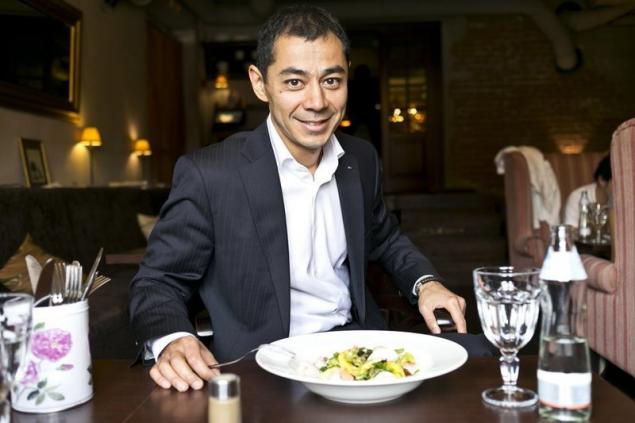607
Power system David Yang, or Changing life for the better
Healthy eating — a topic that preoccupies many people. However, there are many theories and diets, among which there are questionable, and indeed very useful.
Speaking of healthy eating, it is impossible not to dwell on the power system David Yang (SPD). Many know this man as one of the most famous and successful IT entrepreneurs in Russia. And not all realize that David spent a lot of effort, learned a lot of information, consulted with leading experts to bring your own power supply system, which allows him to be in such a great state of mind and body. Moreover, in order to share his knowledge, he wrote a book "Now I eat whatever I want!".
It's not just a book — this book is for those who want a good and young look and feel.

"NOW I EAT WHATEVER I WANT!"The story of how I and my family have rid of the addiction
David Yan. Moscow 2012."I'm not a doctor or nutritionist. I hate the word diet. Why, then, I decided to write a book about nutrition? When my friends learn that I started to eat,, and thus dropped for the month a few pounds, returning to the weight of 18 years age, have got beautiful muscles, as the soul and body began to feel like a teenager, stopped hurting and "plant" on its system supply the whole family, including parents and the babysitter the first thing I hear is the words: "David, come, tell me how you eat! I need it, too! I'm tired of sad to not see the positive changes in her figure. I feel I'm doing something wrong...".
And I began to talk about their diet all friends. As a result, many of them decided to eat as I, and I am very happy. The majority of them decided it's not for the purpose of weight loss and gain health, energy and youth. And the fact that they at the same time for 3 weeks unexpectedly lost weight 3-5 kg and then effortlessly continued to lose weight (if wanted), discovered new tastes and the joys of a new quality of life, the joy of having to add 2 more holes on belts, the joy when I traced the muscles on his back and chest they have not seen since a past life, student years, it was a bonus track to the disk.
In this book I have tried to collect the main arguments that underpin my beliefs and whom I managed to convince my friends."
"...According to the Pareto law, "in achieving the set target of 20% of efforts give 80 % of the final result, and the remaining 80% of the effort — only 20% of result". I was wondering, overeating which products makes the most important contribution to the imbalance in our diet. Which products make the greatest contribution to the development of cardiovascular disease, form clots, and increase the likelihood of strokes, heart attacks and cancer? What foods contribute most to increased daily food intake? What products we are "hooked" since childhood, and then lose control over their use, and then hope to find "scientific proof" that these products are still needed for our body, and if you don't find what we say: "if my body requires, then they need it".
After analyzing the materials of the who, after reviewing dozens of articles, interviews with eminent scientists of the Institute of nutrition of the Russian Academy of Sciences, I discovered that 4 types of products mentioned in the context of power is most often and it can cause 80% or even 95 % of the problems related to nutrition..."
So what are the products, according to David, are "bosom friends" of our body?1. SALT"According to the world health organization, consumption of more than 5 g of salt per day increases the risk of several serious diseases. While the who has not yet officially able to determine the minimum daily requirement of salt. Some research suggests that the optimum amount of salt per day, may be 1-2 g, that is, the amount that we consume in a natural way, without lightly solting, along with meat, fish, vegetables, grains and other products.
And how much salt we actually consume? It turns out that in developed countries people consume in average about 2 g and 5 g, and all 8-16 grams of salt a day!
You say, "well, I do not eat!"And mistaken:
about 2 g of salt initially contained in fresh, natural foods;
— another 3-5 g of salt we get every day with bread (!), different breads and pastries;
— another 3-7 grams per day we consumed with "not very salty" purchased sauces, condiments, prepared foods, sausages, etc., and also in places of public catering;
— still 2-10 grams a day we eat together with a clearly salty taste to the purchase products: cheese, fish smoked, dried and salted, salted nuts, etc.
— and finally, about 2 g of salt per day we add to food with your own hands. One pinch of salt — about 0.3 g.
Ie the truth is that only 2 g of salt we add to food with your own hands, and 6-14 g, we obtain products with modern dietary behavior.
According to studies, the consumption of salt in such quantities increases the risk of stroke and coronary heart disease is 2-3 times that of stomach cancer is 6 times.Salt contributes to overeating.
2. FATSSaturated fats (animal fats, but fat fish and shellfish) is harmful in any quantity. Saturated fats or saturated fatty acids can join together in long chains. As a result, they are not excreted, and the excess accumulates in all the wrong places and cause obesity and disease. Unsaturated fats (vegetable fat) — 30 g per day are useful and necessary for our body but more of this norm is harmful. In order for you to imagine what is 30 g of fat, say that this number contains 300 g of lean fish.
And you know how much we eat fat? In Russia this figure is an average of 105 grams per day! In the United States — more than 150! Mostly due to the harmful saturated fats.Again, you object that you never consume more than 100 grams of fat a day.
And again, likely to go wrong. Fresh meat on the average contains 20 % fat, sausage Amateur 39 %, semi-smoked sausage 64 %, sausages 23 % sausage 22 %. Thus, eating a daily amount of 300 g of meat products, we are already receiving at least 60-70 grams of fat (note: most that neither is harmful — saturated). If we add to the daily diet, 50 g cheese, 20 g butter, 20 g of butter for frying and cooking products, get another 50 g fats, 20 g butter for seasoning salads, another croissant and mA-a-a-a-lenky puddin ' pop, that easily can reach up to 150 grams of fat a day.
3. SUGARLet's be honest with ourselves. Sugar is the infection. Drug. And we sugar addicts with a great experience. Personally, I experienced more than 40 years. I do have a sweet tooth. But believe it or not, I didn't eat a single piece of cake for the last 15 years. To be exact, I tried like 20 times. I missed one or two teaspoons to get the necessary experience. Honestly, now it's every time a disappointment. I'm trying the cake in the secret hope to remember those childhood feelings, but I think it is not so tasty. Now the cakes seem to be sickly-sweet and the most terrible — terribly fatty. Is a fatty aftertaste discourages trying (to not to be disappointed) another six months. And most importantly, I no longer suffer from the fact that I didn't eat the cakes. I can try a couple of times a week a small piece of cookie, but if the table is dark chocolate, I'll break off a square of chocolate. Do I like sweet? Yes, still in love. And I think I'll love you forever, unlike fat and salt, which I love forever. I love steam fresh Dorado sashimi salmon or buns? By far, Dorado and sashimi. Dark chocolate I like, probably not less, but in the amount of 1-3 squares a day with well-prepared espresso or ristretto.
With 50 g of sugar a day our body will cope. But we eat sugar 2-4 times more!4. CARBOHYDRATESBread and flour products — very tasty food (sigh). And what is their disadvantage?
Most flour products including white bread, have a high glycemic index (GI). The higher the GI, the faster the product is converted to glucose and the more of that product is deposited in fat. Most flour products contain harmful saturated fats. Flour products, including purchased bread, contain huge amounts of salt — about 10 to 14 grams of salt per 1 kg of the finished product. That is, when the consumption of 300 g of bread per day we only with him, with our favorite bread consumed 3-5 grams of salt!
So what to do? Do not eat bread at all?Bread and starchy foods is possible and necessary. The question is, what kind of bread and how much.
According to the who, complex carbohydrates should be from 50% to 70 % of the daily energy intake. One of them must be at least 400 g of vegetables, fruits and at least 30 g of legumes, nuts or seeds. Otherwise it may be boiled cereals, cereals, bread from wheat flour, boiled potatoes (not fried and not baked!), pasta from durum, bean products, soy, again, vegetables, fruits.
So as to purchase the finished product or semi-product contains a lot of salt, I recommend salt-free and yeast-free bread to cook at home. It's very simple: no complicated bread and long preparations it is possible to bake delicious bread cakes with a low glycemic index!
So, we briefly learned the main points of the power system from David. Finally, we would like to ask the author.
David, what prompted you to take this step, as creating your own power system?David: I Think in every person's life there comes a moment when he finally thinks about his health. Previously, I often experimented with a variety of restrictions in food. I wanted to see who is stronger: me or the wishlist of my body. Ten years I did not eat after six in the evening, the year of the hungry every Wednesday for some time was a vegetarian. I was curious to prove yourself who is the boss. Then it was rather the strength of will to a greater extent than the path to a healthy lifestyle. But recently I decided to stop experiments and seriously to understand what food actually harms us, and what helps. Read dozens of scientific papers, articles who have studied the recommendations and tables. And just started to eat right.
Soon I learned to enjoy healthy food, I realized how many lose all my dear relatives, spouse, parents, friends who do not eat. Moreover, I realized with horror that my family, without realizing it, transmit harmful food habits to my children.
And then I decided to write a brief summary of the thesis, which drew in the studied material, to convince households to change their food habits and to protect children from harmful products. So appeared the first version of this book, which soon becomes overgrown with details, facts, statistics, recipes.published
P. S. And remember, only by changing their consumption — together we change the world! ©
Join us in Facebook , Vkontakte, Odnoklassniki
Source: gentls.ru/article/menyaem-zhizn-k-luchshemu-ili-sistema-pitaniya-davida-yana.html
Speaking of healthy eating, it is impossible not to dwell on the power system David Yang (SPD). Many know this man as one of the most famous and successful IT entrepreneurs in Russia. And not all realize that David spent a lot of effort, learned a lot of information, consulted with leading experts to bring your own power supply system, which allows him to be in such a great state of mind and body. Moreover, in order to share his knowledge, he wrote a book "Now I eat whatever I want!".
It's not just a book — this book is for those who want a good and young look and feel.

"NOW I EAT WHATEVER I WANT!"The story of how I and my family have rid of the addiction
David Yan. Moscow 2012."I'm not a doctor or nutritionist. I hate the word diet. Why, then, I decided to write a book about nutrition? When my friends learn that I started to eat,, and thus dropped for the month a few pounds, returning to the weight of 18 years age, have got beautiful muscles, as the soul and body began to feel like a teenager, stopped hurting and "plant" on its system supply the whole family, including parents and the babysitter the first thing I hear is the words: "David, come, tell me how you eat! I need it, too! I'm tired of sad to not see the positive changes in her figure. I feel I'm doing something wrong...".
And I began to talk about their diet all friends. As a result, many of them decided to eat as I, and I am very happy. The majority of them decided it's not for the purpose of weight loss and gain health, energy and youth. And the fact that they at the same time for 3 weeks unexpectedly lost weight 3-5 kg and then effortlessly continued to lose weight (if wanted), discovered new tastes and the joys of a new quality of life, the joy of having to add 2 more holes on belts, the joy when I traced the muscles on his back and chest they have not seen since a past life, student years, it was a bonus track to the disk.
In this book I have tried to collect the main arguments that underpin my beliefs and whom I managed to convince my friends."
"...According to the Pareto law, "in achieving the set target of 20% of efforts give 80 % of the final result, and the remaining 80% of the effort — only 20% of result". I was wondering, overeating which products makes the most important contribution to the imbalance in our diet. Which products make the greatest contribution to the development of cardiovascular disease, form clots, and increase the likelihood of strokes, heart attacks and cancer? What foods contribute most to increased daily food intake? What products we are "hooked" since childhood, and then lose control over their use, and then hope to find "scientific proof" that these products are still needed for our body, and if you don't find what we say: "if my body requires, then they need it".
After analyzing the materials of the who, after reviewing dozens of articles, interviews with eminent scientists of the Institute of nutrition of the Russian Academy of Sciences, I discovered that 4 types of products mentioned in the context of power is most often and it can cause 80% or even 95 % of the problems related to nutrition..."
So what are the products, according to David, are "bosom friends" of our body?1. SALT"According to the world health organization, consumption of more than 5 g of salt per day increases the risk of several serious diseases. While the who has not yet officially able to determine the minimum daily requirement of salt. Some research suggests that the optimum amount of salt per day, may be 1-2 g, that is, the amount that we consume in a natural way, without lightly solting, along with meat, fish, vegetables, grains and other products.
And how much salt we actually consume? It turns out that in developed countries people consume in average about 2 g and 5 g, and all 8-16 grams of salt a day!
You say, "well, I do not eat!"And mistaken:
about 2 g of salt initially contained in fresh, natural foods;
— another 3-5 g of salt we get every day with bread (!), different breads and pastries;
— another 3-7 grams per day we consumed with "not very salty" purchased sauces, condiments, prepared foods, sausages, etc., and also in places of public catering;
— still 2-10 grams a day we eat together with a clearly salty taste to the purchase products: cheese, fish smoked, dried and salted, salted nuts, etc.
— and finally, about 2 g of salt per day we add to food with your own hands. One pinch of salt — about 0.3 g.
Ie the truth is that only 2 g of salt we add to food with your own hands, and 6-14 g, we obtain products with modern dietary behavior.
According to studies, the consumption of salt in such quantities increases the risk of stroke and coronary heart disease is 2-3 times that of stomach cancer is 6 times.Salt contributes to overeating.
2. FATSSaturated fats (animal fats, but fat fish and shellfish) is harmful in any quantity. Saturated fats or saturated fatty acids can join together in long chains. As a result, they are not excreted, and the excess accumulates in all the wrong places and cause obesity and disease. Unsaturated fats (vegetable fat) — 30 g per day are useful and necessary for our body but more of this norm is harmful. In order for you to imagine what is 30 g of fat, say that this number contains 300 g of lean fish.
And you know how much we eat fat? In Russia this figure is an average of 105 grams per day! In the United States — more than 150! Mostly due to the harmful saturated fats.Again, you object that you never consume more than 100 grams of fat a day.
And again, likely to go wrong. Fresh meat on the average contains 20 % fat, sausage Amateur 39 %, semi-smoked sausage 64 %, sausages 23 % sausage 22 %. Thus, eating a daily amount of 300 g of meat products, we are already receiving at least 60-70 grams of fat (note: most that neither is harmful — saturated). If we add to the daily diet, 50 g cheese, 20 g butter, 20 g of butter for frying and cooking products, get another 50 g fats, 20 g butter for seasoning salads, another croissant and mA-a-a-a-lenky puddin ' pop, that easily can reach up to 150 grams of fat a day.
3. SUGARLet's be honest with ourselves. Sugar is the infection. Drug. And we sugar addicts with a great experience. Personally, I experienced more than 40 years. I do have a sweet tooth. But believe it or not, I didn't eat a single piece of cake for the last 15 years. To be exact, I tried like 20 times. I missed one or two teaspoons to get the necessary experience. Honestly, now it's every time a disappointment. I'm trying the cake in the secret hope to remember those childhood feelings, but I think it is not so tasty. Now the cakes seem to be sickly-sweet and the most terrible — terribly fatty. Is a fatty aftertaste discourages trying (to not to be disappointed) another six months. And most importantly, I no longer suffer from the fact that I didn't eat the cakes. I can try a couple of times a week a small piece of cookie, but if the table is dark chocolate, I'll break off a square of chocolate. Do I like sweet? Yes, still in love. And I think I'll love you forever, unlike fat and salt, which I love forever. I love steam fresh Dorado sashimi salmon or buns? By far, Dorado and sashimi. Dark chocolate I like, probably not less, but in the amount of 1-3 squares a day with well-prepared espresso or ristretto.
With 50 g of sugar a day our body will cope. But we eat sugar 2-4 times more!4. CARBOHYDRATESBread and flour products — very tasty food (sigh). And what is their disadvantage?
Most flour products including white bread, have a high glycemic index (GI). The higher the GI, the faster the product is converted to glucose and the more of that product is deposited in fat. Most flour products contain harmful saturated fats. Flour products, including purchased bread, contain huge amounts of salt — about 10 to 14 grams of salt per 1 kg of the finished product. That is, when the consumption of 300 g of bread per day we only with him, with our favorite bread consumed 3-5 grams of salt!
So what to do? Do not eat bread at all?Bread and starchy foods is possible and necessary. The question is, what kind of bread and how much.
According to the who, complex carbohydrates should be from 50% to 70 % of the daily energy intake. One of them must be at least 400 g of vegetables, fruits and at least 30 g of legumes, nuts or seeds. Otherwise it may be boiled cereals, cereals, bread from wheat flour, boiled potatoes (not fried and not baked!), pasta from durum, bean products, soy, again, vegetables, fruits.
So as to purchase the finished product or semi-product contains a lot of salt, I recommend salt-free and yeast-free bread to cook at home. It's very simple: no complicated bread and long preparations it is possible to bake delicious bread cakes with a low glycemic index!
So, we briefly learned the main points of the power system from David. Finally, we would like to ask the author.
David, what prompted you to take this step, as creating your own power system?David: I Think in every person's life there comes a moment when he finally thinks about his health. Previously, I often experimented with a variety of restrictions in food. I wanted to see who is stronger: me or the wishlist of my body. Ten years I did not eat after six in the evening, the year of the hungry every Wednesday for some time was a vegetarian. I was curious to prove yourself who is the boss. Then it was rather the strength of will to a greater extent than the path to a healthy lifestyle. But recently I decided to stop experiments and seriously to understand what food actually harms us, and what helps. Read dozens of scientific papers, articles who have studied the recommendations and tables. And just started to eat right.
Soon I learned to enjoy healthy food, I realized how many lose all my dear relatives, spouse, parents, friends who do not eat. Moreover, I realized with horror that my family, without realizing it, transmit harmful food habits to my children.
And then I decided to write a brief summary of the thesis, which drew in the studied material, to convince households to change their food habits and to protect children from harmful products. So appeared the first version of this book, which soon becomes overgrown with details, facts, statistics, recipes.published
P. S. And remember, only by changing their consumption — together we change the world! ©
Join us in Facebook , Vkontakte, Odnoklassniki
Source: gentls.ru/article/menyaem-zhizn-k-luchshemu-ili-sistema-pitaniya-davida-yana.html























